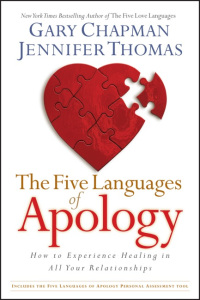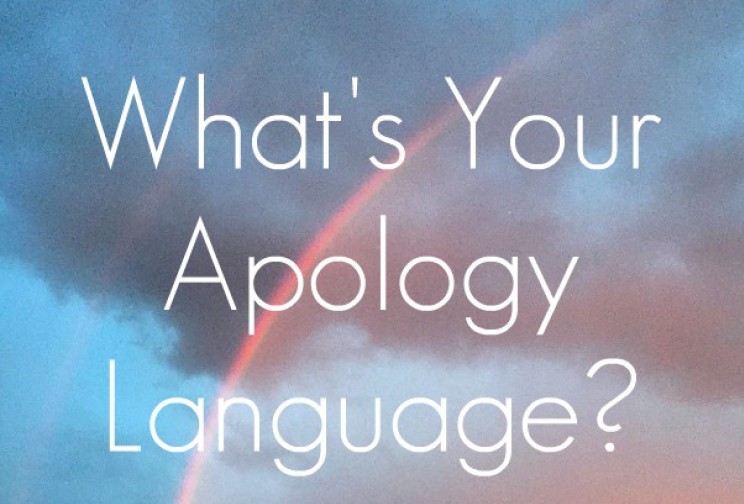A while after I discovered Dr. Gary Chapman’s book, ‘The Five Love Languages,’ (which I blogged about a while back), I came across another of his publications called, ‘The Five Languages of Apology.’

Each one of us has a different way of receiving an apology as sincere. I hope that the following will make you ponder on this notion of having an apology language, perhaps to learn yours and that of your loved ones:
- Expressing Regret
“I’m sorry”
When someone has done something wrong and want their partner to feel their sincere apology, they must learn how to speak the language of regret by focusing on their spouse’s pain and their own behaviour; and how these two are related.
Identifying with their pain will stimulate in your partner a willingness to forgive. Also, one’s body language needs to agree with those words of regret to convey sincerity. Being specific about one’s apology comes across as both sincere and genuine; such as saying, “I’m sorry for __________.”
EXAMPLES OF EXPRESSING REGRET:
-
“I feel bad that I disappointed you. I should have been more thoughtful. I’m sorry that I caused you so much pain.”
-
“I am sorry that I violated your trust. I’ve created a roadblock in our relationship that I want to remove. I understand that it may take a while for you to trust me again.”
- Accepting Responsibility
“I was wrong”
Another important part of an apology is acknowledging that one’s behaviour is wrong. When someone accepts responsibility for their wrong behaviour, it will show their partner that the apology is sincere.
For some people, simply hearing “I’m sorry” is not enough, they want to know that their partner understands what they have done wrong.
EXAMPLES OF ACCEPTING RESPONSIBILITY:
-
“I understand that what I did was wrong. I could try to excuse myself but there is no excuse. I was selfish and wrong to do that.”
-
“The way I spoke to you was wrong. It was harsh and I spoke out of anger. The way I talked to you was unkind.”
- Making Restitution
“What can I do to make it right?”
The idea of making things right is embedded within our human psyche as individuals, as a society, sometimes as a country. We all have built within us this notion of desiring to make things right again.
Restitution often extends beyond words and at times, requires repayment or restoring something that is lost. Other times it could be a public acknowledgment to family, friends or the community if one is in the public eye.
EXAMPLES OF MAKING RESTITUTION:
-
“Is there anything I can do to make up for what I have done wrong?”
-
“I regret that I have damaged your honour. Can I make a public correction to restore what I have done?”
- Genuinely Repenting
“I’ll try not to do that again”
Some couples have the same old arguments about the same old things. Yet they keep repeating the same offending behaviour.
Changing one’s behaviour can take a while to implement but if someone is sincere enough, they will find a way to stop doing what hurts their spouse. Some ways implementation can help is through being accountable to someone else, writing out a specific plan or making the absolute conscious decision to stop repeating bad behaviour. Eventually, small changes will in turn make big differences.
EXAMPLES OF GENUINELY REPENTING:
-
“This is such a long-term pattern for me. I want to change yet I know it will be hard. I would appreciate it if you would help me think about a way to help my changes stick and encourage me when I am breaking through.”
-
“I know that my behaviour was painful to you. I don’t ever want to do that again and I’m open to any idea you have on how to change my behaviour.”
- Requesting Forgiveness
“Will you please forgive me?”
Requesting forgiveness shows that someone wants to see their relationship fully restored. Another reason is that requesting forgiveness shows that one realises that they have done something wrong.
Some people find it hard to seek forgiveness as they fear losing control to the offended person. Or they fear rejection that their spouse won’t forgive them. Or they fear failure by having to admit they are wrong.
If the offence is quite major, it will take a reasonable amount of time for the person that has been hurt to forgive the offender. This is where the offender must follow through with repentance first and then restitution on a continuous basis.
EXAMPLES OF REQUESTING FORGIVENESS:
-
“I know that what I did hurt you very deeply. You have every right never to speak to me again, but I am truly sorry for what I did. And I hope you can forgive me.”
-
“I didn’t intend to hurt you and I now realise that I have. I promise I will try to never do that again and ask if you will forgive me.”

HOW TO WORK OUT YOUR LANGUAGE OF APOLOGY
There are 3 questions to ask yourself to help you discover your own apology language.
The first one is asking,
“What do I expect this person to say or do that would make it possible for me to genuinely forgive them?”
Your answer may involve several or all the 5 languages above. But there will be one that will stand out from the rest of them.
The second question to ask is,
“What hurts most deeply about this situation?”
This question is helpful when the offender has not apologised to you yet or you feel that their apology is not satisfying.
The third question is,
“What language is most important to me when I apologise to others?”
The answer to this question can reveal to you that the language you speak to others is probably the language you most wish to receive.

I hope that through this blog, you may have discovered that there is an effective way to apologise to others when you know what their apology language is. Sometimes that notion involves all of the 5 concepts, for example:
“I am sorry for speaking to you so harshly. I was wrong to do that. What can I do to make our relationship right again? I’ll try not to do that again. Will you please forgive me?”
Or it could just involve one of the 5 languages to be received as sincere, depending on your partner’s language.
Whichever way works for you and your loved ones, I trust that it will help you resolve conflicts lovingly and genuinely.
“Love doesn’t keep a score of wrongs. Love doesn’t bring up past failures. None of us is perfect. In marriage we do not always do the right thing. Forgiveness is the way of love,” – Dr. Gary Chapman, author of ‘The Five Languages of Apology’.
Disclaimer: The content within is general information only. Speak with a counsellor for advice on your specific relationship circumstance or visit www.relationships.org.au




